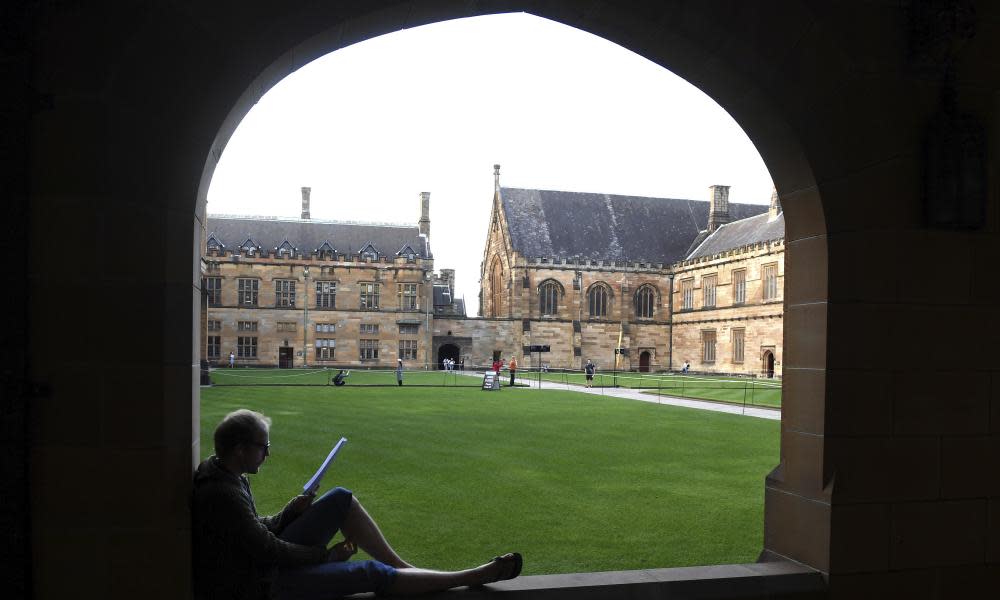To really defend freedom at Australian universities, we must fight for workplace security

“Every time I feel compelled to disagree with something, even at a minor level, I hesitate. My future employment comes to mind, my livelihood hangs in the balance.”
That was a university worker, decrying, back in 2018, how casualisation stifled academic debate.
He or she (by necessity, the piece appeared anonymously) explained that if sessional and casual employees attracted controversy, they simply might not work again. Contracts wouldn’t be renewed; shifts would be directed elsewhere; hours would be quietly reduced.
Related: Peter Ridd endorses One Nation bid to protect academic free speech in Australian universities
Free speech, the author concluded, could not be exercised “under unstable employment arrangements, and especially with the unspoken possibility of one of the most aggressive forms of punishment there is: removal of income, and ability to live well, with no notice”.
In the two years since then – and especially over the last few months – employment instability has spread through higher education like a loathsome disease.
The peak body Universities Australia thinks 21,000 university jobs will be lost by the end of 2020. The National Tertiary Education Union thinks redundancies in the sector have already climbed past 11,100 – but warns that no one really knows.
That’s because, as the NTEU’s Michael Evans puts it, “Universities aren’t required to report the actual number of casual staff they employ, other than in Victoria, and because of the nature of their employment, casual staff can be easily terminated or not re-employed, with very little recording of those processes.”
With best estimates suggesting some 100,000 casual staff work in the sector, how do you think academic debate looks right now?
Fortunately, Australia is blessed with politicians who care passionately about speech rights.
“More must be done to protect the academic freedom of Australia’s educators,” says one.
Oh, wait … that’s Pauline Hanson.
“We cannot continue to allow our universities to be dominated by cultural Marxism and purged of alternative views,” she continues on her Facebook page.
Hanson says she has persuaded the government to accept a revised definition of academic freedom in return for supporting its higher education reforms. It’s a consequence of One Nation cozying up to Peter Ridd, whose sacking from James Cook University in 2018 became a cause célèbre on the right, after he critiqued other scientists’ work on climate change and the Great Barrier Reef.
Famously, Hanson performed her own research on global warming, snorkelling over some unbleached coral near Rockhampton with some One Nation chums and then declaring the reef totally fine.
That’s presumably what she means when she promises to protect “methods based on science and facts rather than ideology”.
It’s easy to mock Hanson. But she’s only able to grab a headline with her “cultural Marxism” guff because of the relative silence about the extraordinary vandalism being unleashed on higher education.
Hanson supports a proposal devised by former chief justice Robert French that would guarantee “the freedom of academic staff to teach, discuss, and research and to disseminate and publish the results of their research” and to “make lawful public comment on any issue in their personal capacities”.
That’s well and good.
But the right of workers to comment in a personal or any other capacity has been systematically eroded throughout the country, in part because Hanson and her ilk have successfully campaigned to have them sacked over Facebook posts.
To speak freely, you need confidence you won’t lose your job just because a populist demagogue disagrees with your views on Anzac Day.
That’s why defending freedom in the modern university means, right now, fighting for workplace security.
For all its manifold faults, the traditional system of scholarly tenure provided academics with a degree of independence, allowing them to pursue their research wherever it might lead them.
But that’s long gone.
Even at the best of times, many people teaching at university do not know at the end of each year whether they’ll draw a paycheque in the new semester.
“From the first week of November to the first week of March, many casual academics must either find alternative employment or rely upon government welfare payments to simply make ends meet,” explains Swinburne’s Paul Clifton.
Mind you, he wrote that back in 2014, well before the current crisis hit.
In a more recent piece for the ABC, NN Trakakis describes the corporatisation of higher education as fostering a form of “institutional bullying” in which “the fear and anxiety are such that any incentive to speak out or actively advocate for change [is] overridden”.
As we head into the deepest recession of our lifetimes, many workers outside the universities know too well the emotions Trakakis describes.
We are all scared; we are all anxious. This is not a time that encourages outspokenness.
That’s why, as I’ve argued previously, free speech should be understood through the lens of industrial relations, not culture war. The redundancies rolling through higher education will chill Australian culture – and that silencing will spread elsewhere. If we want to foster open debate in the universities – and in the country as a whole – we must campaign for workplace rights. We need freedom of speech to advocate for secure jobs; we need secure jobs to exercise freedom of speech.
That’s true in the university – and it’s true everywhere else.

 Yahoo News
Yahoo News 
